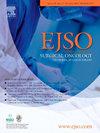Quality of surgery in oncological trials: the patient's perspective
IF 2.9
2区 医学
Q2 ONCOLOGY
引用次数: 0
Abstract
Background
There has recently been increased focus on patient involvement in decision making within healthcare research. Although expert opinion regarding quality of surgery in oncological trials has been reported, the patients’ perspective has not yet been explored.
Methods
Two in-depth focus groups were conducted with ten participants representing the oesophageal patient association (OPA). Focus group discussion explored patients’ opinion regarding quality of surgery in trials and potential mitigating strategies. Identified themes were utilised to create a semi-structured survey subsequently completed by 41 OPA members.
Results
Forty-five themes were identified from thematic analysis of focus group data falling within three categories: quality of surgery (n = 16); challenges to quality of surgery (n = 16) and proposed mitigating strategies (n = 13). Strategies to overcome generic challenges included: further education for non-specialists, and enhancing surgeons' training. Trial specific mitigating strategies included: utilising a structured method of assessing surgeons’ competencies, including specialist centres, and monitoring of surgery. The survey revealed key challenges to quality of surgery included insufficient beds (90 %) and a lack of funding (75 %). Key survey strategies to overcome challenges to quality of surgery included: Monitoring to check operative standards are being met within trials (94 %), and; raising awareness/training regarding postoperative complications amongst non-specialist healthcare providers (94 %).
Conclusion
This is the first study to explore patient perspective on quality of surgery. Public healthcare planners and members of the surgical oncology community should recognise the importance of patient perceived challenges and consider incorporation of their proposed mitigation strategies to improve the quality of surgery in clinical trials.
肿瘤试验中的手术质量:患者的观点
最近,人们越来越关注患者参与医疗保健研究中的决策。虽然关于肿瘤试验中手术质量的专家意见已被报道,但患者的观点尚未被探讨。方法以食管癌患者协会(OPA) 10名代表为研究对象,进行2个深度焦点小组的研究。焦点小组讨论探讨了患者对试验中手术质量和潜在缓解策略的看法。确定的主题被用来创建一项半结构化的调查,随后由41名OPA成员完成。结果从焦点小组数据的主题分析中确定了45个主题,分为三类:手术质量(n = 16);对手术质量的挑战(n = 16)和提出的缓解策略(n = 13)。克服一般挑战的策略包括:对非专科医生的进一步教育和加强外科医生的培训。试验特定的缓解策略包括:利用结构化方法评估外科医生的能力,包括专家中心,并监测手术。调查揭示了影响手术质量的主要挑战包括床位不足(90%)和缺乏资金(75%)。克服手术质量挑战的主要调查策略包括:监测手术标准是否在试验中得到满足(94%);提高非专业医疗保健提供者对术后并发症的认识/培训(94%)。结论本研究首次探讨了患者对手术质量的看法。公共卫生保健规划者和外科肿瘤学社区的成员应该认识到患者感知到的挑战的重要性,并考虑纳入他们提出的缓解策略,以提高临床试验中的手术质量。
本文章由计算机程序翻译,如有差异,请以英文原文为准。
求助全文
约1分钟内获得全文
求助全文
来源期刊

Ejso
医学-外科
CiteScore
6.40
自引率
2.60%
发文量
1148
审稿时长
41 days
期刊介绍:
JSO - European Journal of Surgical Oncology ("the Journal of Cancer Surgery") is the Official Journal of the European Society of Surgical Oncology and BASO ~ the Association for Cancer Surgery.
The EJSO aims to advance surgical oncology research and practice through the publication of original research articles, review articles, editorials, debates and correspondence.
 求助内容:
求助内容: 应助结果提醒方式:
应助结果提醒方式:


